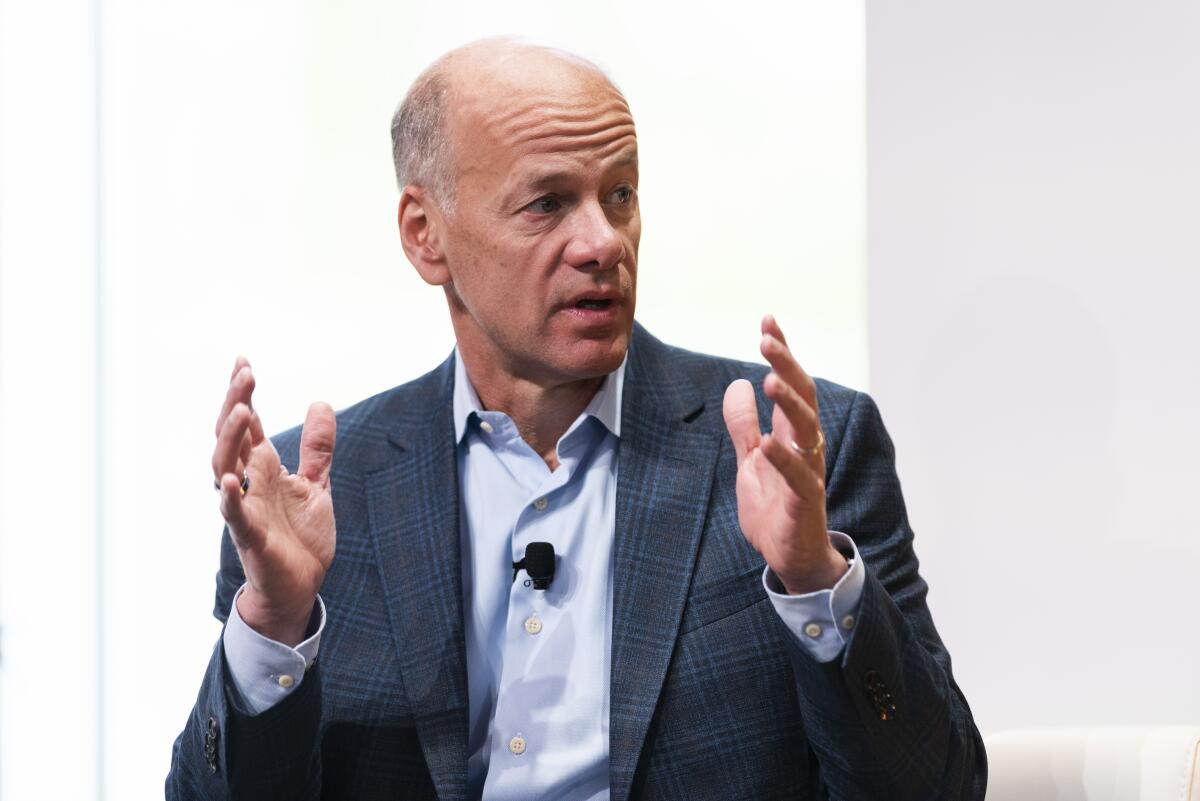Silicon Valley Bank tells clients to ‘stay calm’ as shares sink

- Share via
Peter Thiel’s Founders Fund and a handful of other venture capital firms advised their portfolio companies to pull money from Silicon Valley Bank on Thursday, responding to panic about the bank’s financial situation in tech startup circles.
Founders Fund, a prominent venture capital firm co-founded by billionaire Thiel, has asked its companies to move their funds, according to one person familiar with the matter who asked not to be identified discussing private information.
SVB Financial Group Chief Executive Greg Becker held a conference call Thursday advising clients of SVB-owned Silicon Valley Bank to “stay calm” amid concern about the bank’s financial position, according to another person familiar with the matter.
A representative for Founders Fund declined to comment. A representative for Silicon Valley Bank did not immediately respond to a request for comment.
Becker held the roughly 10-minute call about 11:30 a.m. Pacific time. He asked the bank’s clients, including venture capital investors, to support the bank the way the bank has backed its customers over the last 40 years, according to the person.
Worries surrounding the lender ricocheted around Silicon Valley on Thursday. There is “a good deal of panic,” said Jenny Fielding, managing partner at the fund, which invests in early-stage companies. Fielding said she was watching the situation with the bank closely but had not yet advised her portfolio companies on how to proceed.
Garry Tan, CEO of Y Combinator, warned its network of startups that solvency risk is real and implied they should consider limiting their exposure to the lender.
“We have no specific knowledge of what’s happening at SVB,” Tan wrote in a post viewed by Bloomberg News. “But anytime you hear problems of solvency in any bank, and it can be deemed credible, you should take it seriously and prioritize the interests of your startup by not exposing yourself to more than $250K of exposure there. Your startup dies when you run out of money for whatever reason.”
Venture firm Tribe Capital has advised its portfolio companies to move some, if not all, of their balances from SVB.
“What’s important to understand is that banks all have leverage, and they use deposits, so almost by definition any bank with a business model is dead if everyone moves,” Tribe co-founder Arjun Sethi told portfolio companies in a communication reviewed by Bloomberg. “Since risk is non-zero and the cost is tiny, better to diversify your risk if not all.”
Silvergate specializes in services for crypto clients such as FTX, but as digital assets plunged, Silvergate lost billions in deposits.
Another firm, Activant Capital, sent emails and texts to its portfolio company CEOs encouraging them to transfer their SVB balances to other lenders, and is helping some move capital to First Republic Bank, CEO Steve Sarracino said.
The fear spread after Santa Clara, Calif.-based SVB said Wednesday that it was holding a $2.25-billion share sale after a significant loss on its portfolio, which included U.S. Treasurys and mortgage-backed securities.
In an email Thursday morning signed by Mark Lau, head of Silicon Valley Bank’s venture practice, SVB said it had heard from many of its clients over the previous 24 hours regarding questions about the company’s 8-k filing Wednesday, according to the contents of the email about the conference call reviewed by Bloomberg.
SVB’s shares sank $161.79, or 60.4%, to $106.04 on Thursday, hitting their lowest level since September 2016. Becker’s call was reported earlier by the Information. The shares continued to tumble in after-hours trading.
Some venture capitalists said they were standing by the bank. Investor Keval Desai, founder of Shakti, said not only was he not telling his portfolio companies to withdraw funds, but he also had placed an order to buy the bank’s stock Thursday, with a limit order of $101.
“I am not Warren Buffett,” Desai said, cautioning that he was not dispensing investment advice. “But I think this is a buying opportunity.”
One prominent investor, Mark Suster, warned companies against overreacting to news about the bank. “I believe their CEO when he says they are solvent,” Suster wrote, “and not in violation of any banking ratios.”
Dan Scheinman, an investor who has backed companies including Zoom Video Communications, says he fielded calls Thursday from two early-stage companies in his portfolio, wondering if they should close their accounts with the bank. He advised them to seek more information before taking any steps.
Increasingly offering products untethered to the average consumer’s needs, the tech industry has been dwelling in La La Land. Its real-world expansion into L.A. is no coincidence.
“What do we know about banks you would switch to? Are they in better or worse shape?” he said he advised. “It is a pain to switch, but it is more of a pain if the bank fails.”
An email thread of more than 1,000 founders from Andreessen Horowitz was abuzz with the news Thursday, with many encouraging one another to pull cash from the bank. At one point on the thread, General Partner David George weighed in. “Hi all,” he wrote in a post reviewed by Bloomberg. “We know you have questions about how to handle the SVB situation. We encourage you to pick up the phone and call your GP. Thanks, DG.”
A similar thread was circulating among chief financial officers of big startups, a partner at a major venture firm said.
On the threads, many startup founders and executives worried how a collapse of Silicon Valley Bank would affect Silicon Valley’s infrastructure. The bank could try to liquidate its stakes in portfolio companies, which would further drive down the already flailing valuations of many startups. Those lower valuations in turn would further weaken the balance sheets of other banks, hedge funds and crossover funds that hold the same assets.
More to Read
Inside the business of entertainment
The Wide Shot brings you news, analysis and insights on everything from streaming wars to production — and what it all means for the future.
You may occasionally receive promotional content from the Los Angeles Times.












